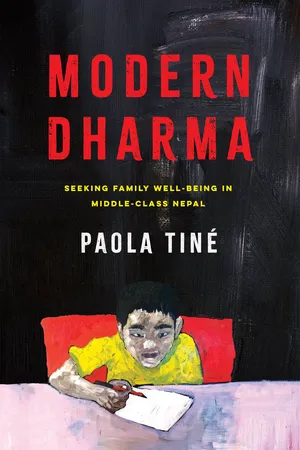
- 240 pages
- English
- ePUB (mobile friendly)
- Available on iOS & Android
About this book
How middle-class families in Nepal pursue "well-being" in a rapidly changing social landscape Modern Dharma asks how middle-class Nepalis pursue an ethical, good life in a rapidly evolving society. In the aftermath of a decade-long civil war that raged between 1996 and 2006, social change accelerated in Nepal as the shift to a market economy and the spread of education and media built the foundation for a new middle class to form. As it did, tension built between the expression of individual will and the expectation to submit to traditional social hierarchies. Today, people in Nepal are confronted by the need to restructure moral codes and to care for their families, while at the same time, they face intense pressure to keep up with the cost of education and to find work in an increasingly competitive labor market. Amidst these changes, people often describe their choices as falling under the broader goal of pursuing well-being. Modern Dharma investigates how and why—amidst often conflicting priorities—people make choices in pursuit of well-being. Anthropologist Paola Tiné investigates why many large families separate into smaller nuclei, while others maintain intra-generational homes. She asks why and how young people seek the support of their friends, while often hiding private desires from their parents. And she investigates the ways that marriage choices and friendship relationships help people navigate the ongoing tangible difficulties engendered by socioeconomic change. By delving into the intricacies of domestic lives among a growing middle class, Modern Dharma works to center the household and kinship relationships as the places where broader global transitions are reflected, resisted, and negotiated. Providing a new perspective on moral personhood in South Asia, this book ultimately sheds new light on the centrality of kinship relationships in initiating and shaping social change.
Frequently asked questions
- Essential is ideal for learners and professionals who enjoy exploring a wide range of subjects. Access the Essential Library with 800,000+ trusted titles and best-sellers across business, personal growth, and the humanities. Includes unlimited reading time and Standard Read Aloud voice.
- Complete: Perfect for advanced learners and researchers needing full, unrestricted access. Unlock 1.4M+ books across hundreds of subjects, including academic and specialized titles. The Complete Plan also includes advanced features like Premium Read Aloud and Research Assistant.
Please note we cannot support devices running on iOS 13 and Android 7 or earlier. Learn more about using the app.
Information
Table of contents
- Cover
- Title Page
- Copyright
- Dedication
- Contents
- List of Figures
- List of Abbreviations
- Note on Terminology and Transliteration
- Prologue
- Chapter 1. Moralities in Transition
- Chapter 2. Envisaging “Better Lives” Across Three Generations: The Rise of the Middle Class in Bhaktapur and Its Existential Perspectives
- Chapter 3. Parent-Child and Child-Peer Dimensions of Friendship: Making Moral Selves Between “Advanceness” and “Shame”
- Chapter 4. “Mutual Understandings” and “Lonely Heart Talks”: Self-Making and Social Change Through Conflict and Adjustment Around Marriage Practices
- Chapter 5. A Room of One’s Own: Well-Being in the House Space
- Chapter 6. Seeking “Heartfelt Help”: The Emergence of the Friendship Guthi
- Chapter 7. To Expect or Not to Expect: Making “Modern” Elders Between Anxiety and Well-Being
- Conclustion: Moral Selves, Social Change, and Hierarchies of Values
- Glossary
- Notes
- Bibliography
- Index
- Acknowledgments